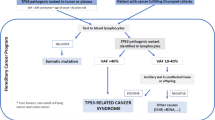Abstract
Germline mutations in the tumor suppressor gene TP53 occur in the majority of families with Li-Fraumeni syndrome, who are at an increased risk for a wide spectrum of early onset cancers. Several genetic polymorphisms in TP53 modify its effect on cancer risk. While some studies indicate that the TP53 PIN3 deletion allele (D) accelerate tumor onset in carriers with TP53 germline mutations, other studies have shown that the TP53 PIN3 insertion allele (I) confers a significantly higher risk of developing cancer than D allele. To further determine the effects of the TP53 PIN3 polymorphism on cancer development among TP53 germline mutations and to evaluate if those are differenence between male and female carriers, we studied a total of 152 germline mutation carriers with available DNA samples that can be used for genotyping. Our results indicate that the TP53 PIN3 polymorphism has a sex-specific effect on the risk of cancer in TP53 mutation carriers, conferring cancer risk in men (P = 0.0041) but not women with DI or II genotypes.



Similar content being viewed by others
References
Bachinski LL, Udd B, Meola G, Sansone V, Bassez G, Eymard B, Thornton CA, Moxley RT, Harper PS, Rogers MT, Jurkat-Rott K, Lehmann-Horn F, Wieser T, Gamez J, Navarro C, Bottani A, Kohler A, Shriver MD, Sallinen R, Wessman M, Zhang SX, Wright FA, Krahe R (2003) Confirmation of the type 2 myotonic dystrophy (CCTG)(n) expansion mutation in patients with proximal myotonic myopathy/proximal myotonic dystrophy of different European origins: a single shared haplotype indicates an ancestral founder effect. Am J Hum Genet 73:835–848
Bond GL, Hirshfield KM, Kirchhoff T, Alexe G, Bond EE, Robins H, Bartel F, Taubert H, Wuerl P, Hait W, Toppmeyer D, Offit K, Levine AJ (2006) MDM2 SNP309 accelerates tumor formation in a gender-specific and hormone-dependent manner. Cancer Res 66:5104–5110
Bougeard G, Baert-Desurmont S, Tournier I, Vasseur S, Martin C, Brugieres L, Chompret A, Bressac-de Paillerets B, Stoppa-Lyonnet D, Bonaiti-Pellie C, Frebourg T (2006) Impact of the MDM2 SNP309 and p53 Arg72Pro polymorphism on age of tumour onset in Li-Fraumeni syndrome. J Med Genet 43:531–533
Dumont P, Leu JI, Della Pietra AC3, George DL, Murphy M (2003) The codon 72 polymorphic variants of p53 have markedly different apoptotic potential. Nat Genet 33:357–365
Fang SY, Krahe R, Lozano G, Han YH, Chen W, Post SM, Zhang BL, Wilson CD, Bachinski LL, Strong LC, Amos CI (2010) Effects of MDM2, MDM4 and TP53 Codon 72 polymorphisms on cancer risk in a cohort study of carriers of TP53 germline mutations. Plos One 5 5(5):e10813
Garber JE, Goldstein AM, Kantor AF, Dreyfus MG, Fraumeni JF Jr, Li FP (1991) Follow-up study of twenty-four families with Li-Fraumeni syndrome. Cancer Res 51:6094–6097
Gemignani F, Moreno V, Landi S, Moullan N, Chabrier A, Gutierrez-Enriquez S, Hall J, Guino E, Peinado MA, Capella G, Canzian F (2004) A TP53 polymorphism is associated with increased risk of colorectal cancer and with reduced levels of TP53 mRNA. Oncogene 23:1954–1956
Hu Z, Li X, Qu XC, He YG, Ring BZ, Song EM, Su L (2010) Intron 3 16 bp duplication polymorphism of TP53 contributes to cancer susceptibility: a meta-analysis. Carcinogenesis 31:643–647
Kleihues P, Schauble B, zur Hausen A, Esteve J, Ohgaki H (1997) Tumors associated with p53 germline mutations: a synopsis of 91 families. Am J Pathol 150:1–13
Marcel V, Palmero EI, Falagan-Lotsch P, Martel-Planche G, Ashton-Prolla P, Olivier M, Brentani RR, Hainaut P, Achatz MI (2009) TP53 PIN3 and MDM2 SNP309 polymorphisms as genetic modifiers in the Li-Fraumeni syndrome: impact on age at first diagnosis. J Med Genet 46:766–772
Marcel V, Thao Tran PL, Sagne C, Martel-Planche G, Vaslin L, Teulade-Fichou MP, Hall J, Mergny JL, Hainaut P, Van DE (2010) G-quadruplex structures in TP53 intron 3: role in alternative splicing and in production of p53 mRNA isoforms. Carcinogenesis 32(3):271–278
Martin AM, Kanetsky PA, Amirimani B, Colligon TA, Athanasiadis G, Shih HA, Gerrero MR, Calzone K, Rebbeck TR, Weber BL (2003) Germline TP53 mutations in breast cancer families with multiple primary cancers: is TP53 a modifier of BRCA1? J Med Genet 40:e34
Nichols KE, Malkin D, Garber JE, Fraumeni JF Jr, Li FP (2001) Germ-line p53 mutations predispose to a wide spectrum of early-onset cancers. Cancer Epidemiol Biomarkers Prev 10:83–87
Weeks DE, Sobel E, Oconnell JR, Lange K (1995) Computer-programs for multilocus haplotyping of general pedigrees. Am J Hum Genet 56:1506–1507
Conflict of interest
The authors declare no conflicts of interest.
Author information
Authors and Affiliations
Corresponding author
Electronic supplementary material
Below is the link to the electronic supplementary material.
Rights and permissions
About this article
Cite this article
Fang, S., Krahe, R., Bachinski, L.L. et al. Sex-specific effect of the TP53 PIN3 polymorphism on cancer risk in a cohort study of TP53 germline mutation carriers. Hum Genet 130, 789–794 (2011). https://doi.org/10.1007/s00439-011-1039-0
Received:
Accepted:
Published:
Issue Date:
DOI: https://doi.org/10.1007/s00439-011-1039-0




